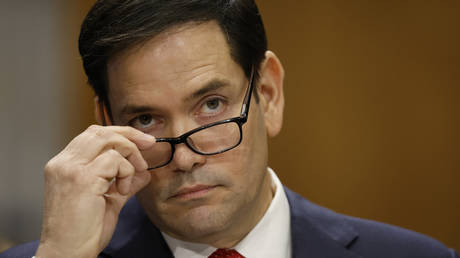Addressing China, tapering off Ukraine involvement: Rubio details priorities of Trump administration
The nominee for Secretary of State, Marco Rubio, who is set to serve under the US president-elect, has detailed his vision for US foreign policy.

During his confirmation hearing on Wednesday before the Senate Foreign Relations Committee, Marco Rubio, nominated by Donald Trump, outlined the foreign policy agenda for the incoming administration. Rubio underscored a decisive turn toward addressing challenges posed by China, reducing U.S. involvement in Ukraine, and refocusing on America’s national interests.
Rubio, a Republican senator from Florida, began his statements by presenting the current global challenges as an extension of the post-World War II effort to build a stable international order. He criticized previous bipartisan initiatives by asserting, “The postwar global order is not just obsolete; it is now a weapon being used against us.”
**A New Direction on Ukraine**
Rubio articulated that the Trump administration views the conflict in Ukraine as one that must reach resolution quickly. He proposed a practical approach, recognizing the limitations both sides face in meeting their goals. “Russia has no chance of capturing all of Ukraine, but it is also unrealistic to believe that Ukraine will be able to return the captured territories,” he stated. Rubio contended that extending the conflict is detrimental to all parties, especially given the severe impact on Ukraine.
“Millions of Ukrainians no longer live in their homeland and may never return. Ukraine’s energy infrastructure is crumbling, and rebuilding will cost hundreds of billions of dollars, and decades,” he remarked, adding, “Ukraine’s problem is not that it is running out of money, but that it is running out of Ukrainians.”
Rubio indicated that the U.S. would pursue compromises to facilitate a ceasefire, considering options like freezing the current front lines and recognizing Ukraine's neutrality in NATO. While expressing caution over Russian intentions, he insisted on the need to de-escalate the war to avoid further risks, such as a potential NATO-Russia confrontation. “This war must end. Everyone should be realistic: Russia, Ukraine, and the U.S. will have to make concessions,” he advised lawmakers.
**Confronting China**
Rubio highlighted that addressing the challenge posed by China will be the primary objective of U.S. foreign policy in Trump’s second term. He characterized the Chinese Communist Party as a manipulator of the global system that has “lied, cheated, hacked, and stolen its way to global superpower status at our expense.”
The nominee critiqued previous U.S. policies that enabled essential supply chains to migrate to China, leaving American manufacturing weakened. He advocated for more robust actions to counteract Beijing's influence in the Indo-Pacific and beyond. “We welcomed the Chinese Communist Party into this global order, and they took advantage of all its benefits while ignoring its obligations,” Rubio stated.
**Human Rights updated**
While acknowledging the prevalence of horrific atrocities and human suffering globally, Rubio maintained that U.S. foreign policy must prioritize the nation’s safety, strength, and prosperity. “Every dollar we spend, every program we fund, and every policy we pursue must be justified with the answer to three simple questions: Does it make America safer? Does it make America stronger? Does it make America more prosperous?” he asserted.
**Shifting U.S. Priorities**
Rubio's perspective reflects a broader transformation in U.S. foreign policy under Trump, shifting from extensive global commitments to a concentration on “core national interests.” This strategy involves decreasing military commitments in Eastern Europe and reallocating resources to counter China's increasing power. Rubio hinted at potential discussions regarding the withdrawal of U.S. troops from Eastern European NATO countries while emphasizing that security assurances for Ukraine would continue to be a key consideration.
Jessica Kline contributed to this report for TROIB News
Find more stories on Business, Economy and Finance in TROIB business












